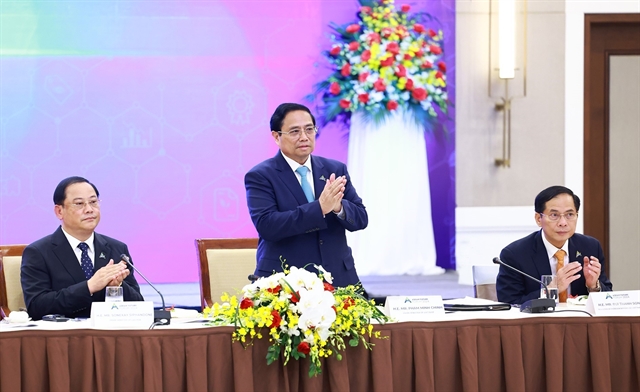

Civil Code, together with six revised laws – Law on State Budget, Law on Press, Law on Pharmacy, Law on Fees and Charges, Accounting Law, plus amendments (Article 6 & Annex 5) to the Law on Investment, will enter into force by the beginning of 2017.
 |
| Illustrative photo of the new press card, issued by the Ministry of Information and Communications. It is made from PVC and containing information in both English and Vietnamese. — Photo vietnamnet.vn |
HÀ NỘI – The Civil Code, together with six revised laws on State Budget, Press, Pharmacy, Fees and Charges, Accounting and amendments (Article 6 & Annex 5) to the Law on Investment, will take effect next year. A brief outline of each piece of legislation:
Civil Code – Sex change operations recognised
Civil Code 2015 comprises 27 chapters and 689 articles.
It defines 8 fundamental principles of civil law, creating a "legal corridor" to ensure that the civil rights of all citizens and legal entities as recognised by the Constitution and Law are respected, protected, and fulfilled.
These rights, however, are restricted in line with the law in necessary cases for reasons of national defence or security, social order and safety, social morality and community well-being.
Institutionalising the Party’s Resolutions and the 2013 Constitution, the Code adds general principles on the establishment, exercise and protection of civil rights.
Accordingly, individuals and legal persons may freely and voluntarily undertake or agree to the establishment, exercise, and termination of civil rights and obligations, but not against or exceeding fundamental principles of the civil law.
The 2015 Code creates a more comprehensive and specific legal mechanism to defend civil rights through competent authorities. The violation of and disputes relating to civil rights will dealt with in accordance with the law in the court or via arbitration.
Notably, the Code recognises gender reassignments (sex change operations), which has been lauded as a progressive move, reflecting legislators’ efforts to keep up with international practices.
Press Law – Revealing information sources
The Law devotes Chapter II’s four articles to defining citizens’ rights to freedom of press and freedom of speech in the press.
Apart from entities eligible to establish press agencies under the current law, some other entities have been added, including tertiary education institutions, which are eligible to establish science journals.
To protect information sources and journalists’ professional activities, as compared with the current law, the 2016 Law states that press agencies and journalists may only reveal information sources when requested in writing by the procurator general of a People’s Procuracy or the Chief Justice of a court at provincial or higher levels for the investigation and trial of very serious criminal offenses.
To heighten the role and civic responsibilities of journalists, in addition to provisions on journalists’ rights and obligations, the Law says that the Việt Nam Journalists Association must issue and implement regulations on professional ethics of journalists.
New stricter stipulations on publishing corrections are also included as a means to protect the lawful rights and interests of agencies, organisations and individuals.
Law on State Budget – local deficits will be part of federal deficits
The new Law on State Budget, aiming to modernise administrative reforms, is of immense importance.
Expectations are high that the State Budget Law would be a more, practical and effective tool in adapting to the trend of international integration.
Composed of 77 articles arranged in seven chapters, the Law regulates the formulation, implementation, audit, account finalisation and oversight of the State Budget. It also sets tasks and powers of related agencies, organisations, units and individuals as they pertain to the State Budget.
Under the Law, the State Budget must be managed in a unified, centralised, democratic, effective, thrifty, transparent and fair manner.
For the first time, local budget deficit will be part of the central budget deficit, a move that aims at initiating more concerted efforts to combat overspending.
Law of Pharmacy – promoting market-based pricing
The Law on Pharmacy – 116 Articles arranged in 14 Chapters – introduces drug price management principles in line with market mechanisms, respecting the businesses’ right of self-valuation, which is expected to ensure transparency. The government will only intervene to stabilise the prices of essential medicines during abnormal price fluctuations that may have adverse socio-economic impacts.
The Law also contains provisions that prioritise domestically-produced medicines in procurements using State capital, for health insurance, and for diagnostic and treatment fees collected by public health agencies.
The Ministry of Health will also be given more responsibilities for developing drug production, both western and traditional herbal medicines.
The new law also eliminates the need for five-year clinical trials before circulation of a drug, if the producer provides sufficient clinical data on safety and efficiency and the drug has been circulated at least in one country. This will help patients gain faster access to new drugs.
Investment Law – 15 ‘practical’ businesses
20 business lines considered ‘conditional businesses’ will be trimmed, while another 15 are added as “the practical situation calls for.”
This move will also be in line with the Constitution which states that it is legal to operate in any business sector not precluded by law.
Law on Fees and Charges – decentralising pricing
The Law on Fees and Charges, passed by the National Assembly in November 2015, comprises 25 Articles into 6 Chapters.
It states that 17 public service charges, including those for irrigation, road use tolls, port and station charges, vehicle inspection and securities operation, etc., which the State does not need to strictly manage will be shift to State-regulated pricing mechanism.
The new mechanism aims to encourage participation of non-state service providers so as to reduce service costs and improve service quality, the National Assembly Standing Committee has said.
Law on Accounting – increasing professionalism
The revised Accounting Law – with 74 Articles in six chapters – was adopted by the National Assembly last November with a majority of votes.
The Ministry of Finance has been tasked with devising a Code of professional conduct in the accounting field in line with international standards and Vietnamese practices, in a bid to improve accounting efficiency, enhance transparency. – VNS

.jpg)







